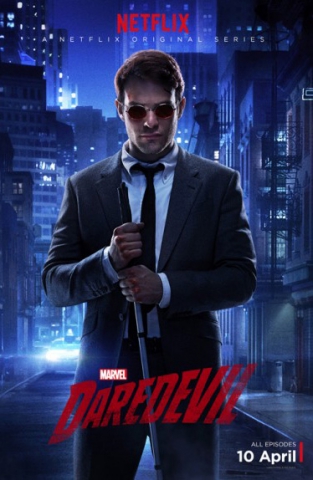 Note: All 13 episodes of Daredevil were released for instant streaming on Netflix on April 10. This post discusses the entirety of the series without major plot spoilers.
Note: All 13 episodes of Daredevil were released for instant streaming on Netflix on April 10. This post discusses the entirety of the series without major plot spoilers.
“I’ve been preoccupied of late with questions of morality. Of right and wrong, good and evil,” Matt Murdock muses from a confessional at the opening of the series Daredevil, a 13-episode Netflix show based on the Marvel comic book of the same name.
Matt (Charlie Cox) is a native New Yorker and devout Catholic who lost his vision in an accident as a child. Now a lawyer, he has turned down a lucrative job at a high-power firm to start a private practice with his law school buddy Foggy Nelson (Elden Henson), where the two of them fight by day for justice for ordinary people.
But by night, Matt dons a black mask and takes justice into his own hands — literally. The son of a boxer, Matt uses his senses heightened by his lack of sight to punch and kick those seedy characters who threaten the safety of “his city.”
The danger mainly stems from kingpin Wilson Fisk (Vincent D’Onofrio) — a powerful man hoping to redevelop the city to his advantage — and the vast network of people in his pocket. (Fans of the Marvel Cinematic Universe will note that the city is rebuilding from the aftermath of the climactic battle from 2012’s The Avengers. We see what happens when the superheroes fly away and normal people are left to pick up the pieces.)
While Matt may be Catholic, it becomes clear that he is certainly not a saint. The methods Matt employs in his fight for justice can be construed as torture. Even more troublesome is Matt’s claim that he enjoys his violent distribution of justice.
This is certainly not a family-friendly comic book caper. Daredevil’s world is a dark one, and the show makes no attempt to spare viewers from the death and destruction that accompanies each fistfight, gunshot, explosion, and even one gruesome decapitation. It can be a lot to handle, especially if binge-watching the series, easily encouraged by the Netflix distribution.
But while the violence is graphic and intense, it is not glorified. We see the pain felt by those on all sides of the conflict when someone they care about is hurt. Matt maintains that what he is doing is necessary, but that doesn’t stop him from feeling guilt and doubt about his double life.
The more Matt becomes mired in Fisk’s tangled web, the more often he returns to his church, seeking out conversations with his priest, one of the few characters on the show who knows Matt’s identity (protected by the seal of confession, of course). Matt asks his priest whether he believes in the devil. If God created us all for a purpose, why does Matt feel evil inside of him? What if killing Fisk is the only way to keep the city safe? “Another man’s evil does not make you good,” the priest cautions.
Matt takes pride in the fact that he has never killed anyone, demonstrating a value of human life that somewhat contradicts his violent methods. But as it becomes obvious that Fisk has too many police and judges in his employ to meet a just end in the confines of the law, Matt struggles to consider the alternatives. Could he find it in himself to kill Fisk, if it came to that? Does he need to? Does he want to? That the answer to that final question might be "yes" is unsettling.
Daredevil presents questions that may sound familiar to many Catholics. What happens when the marginalized have no say over decisions that affect their lives, when power is concentrated in the hands of the few and the rich? How do we serve those who may not be able to protect themselves? Do the ends justify the means when you are fighting the good fight? How much of a difference can one person’s actions make against an unjust system?
It makes sense that, as a Catholic, Matt is upset by injustice and wishes to protect his neighbors. The series offers many moral and ethical questions to consider, not least of which is: Do we turn a blind eye to injustice, or do we do whatever it takes to make our world a better place?
Photo courtesy of Netflix















Add comment